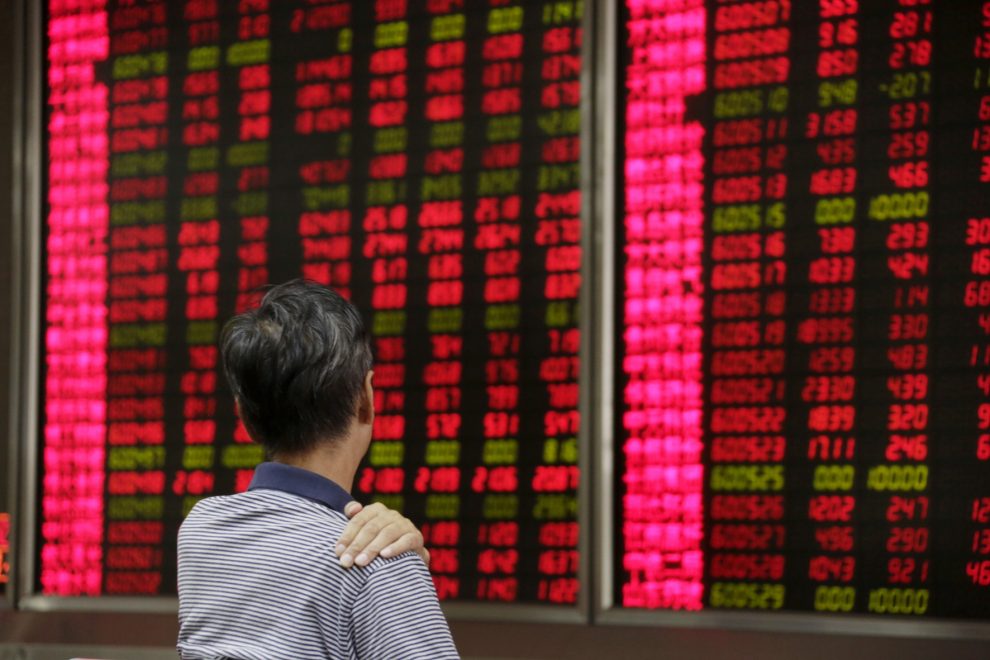Asian markets began the week in the red again as global pessimism saw the US dollar surge on safe haven inflows and the British pound plummet sending shockwaves across the region’s trading floors and knocking shares to a two-year low.
Japanese stocks plunged with their own currency under serious strain too, while even usually more domestically-focused Chinese stocks were forced into retreat despite the relaxation of some travel rules into the country.
Tokyo shares were down as investors returned from a long weekend to markets that were dented by Japanese authorities’ long-awaited currency intervention last week.
Also on AF: Huawei Comeback Drive Fuelled by Hit EV and Patriotic Fervour
The Nikkei dropped 2.66% to end at 26,431.55 after slipping as far as 26,424.60, its lowest level since July 14. The index has now fallen for three straight days and is down more than 5% since the beginning of last week. The broader Topix fell 2.7%.
Stock markets tracked broader Asian peers lower after the US dollar soared and bond yields strengthened amid increasing fears of a global recession.
The yen was last at 143.8 to the dollar, having weakened 2.43% since the Ministry of Finance’s intervention drove it to 140.31 last week, while the benchmark 10-year Treasury yield was at 3.7627%.
Japanese authorities last week intervened in the foreign exchange market to shore up the battered yen for the first time since 1998.
Shares of chipmaking equipment manufacturer Tokyo Electron weighed on the Nikkei the most with a 4.14% drop, followed by SoftBank Group Corp’s 5.2% slide.
MSCI’s broadest index of Asia-Pacific shares outside Japan was down 1.4% to a two-year low and is heading for a monthly loss of 11%, the largest since March 2020.
China Macau Boost Fades
Chinese blue chips and Hong Kong shares started the day on the front foot with tourism and casino stocks leading the gains as Macau said China would resume an e-visa scheme for mainland travellers and permit group tours.
An index representing Macau casino operators soared nearly 12% on the news.
Investor sentiment was also boosted by a move from the Chinese central bank to support the slumping currency.
But that good feeling evaporated as global events took their toll on investor sentiment later in the day on the mainland and in Hong Kong.
The Shanghai Composite Index dipped 1.2%, or 37.14 points, to 3,051.23, while the Shenzhen Composite Index on China’s second exchange dropped 0.75%, or 14.69 points, to 1,949.00.
The Hang Seng Index dropped 0.44%, or 78.13 points, to 17,855.14.
Elsewhere across the region, stocks fell with most currencies hitting multi-year lows against the dollar.
Equities in Seoul and Taipei led the losses as they dropped 3% and 2.4%, respectively, while shares in Jakarta and Singapore retreated 1.3% and 1.5%.
Indian stocks dipped with Mumbai’s signature Nifty 50 index down 1.33%, or 231.00 points, at 17,096.35.
UK Treated as ‘Emerging Market’
Globally, sterling slumped to a record low, prompting speculation of an emergency response from the Bank of England, as confidence evaporated in Britain’s plan to borrow its way out of trouble, with spooked investors piling into US dollars.
S&P 500 futures fell 0.8% and European futures fell 0.7%. Two-year Treasury yields broke above 4.3% to a new 15-year high. The euro hit a 20-year low.
“The movements over the last couple of trading days are quite fierce,” said Paul Mackel, global head of FX research at HSBC in Hong Kong. “It’s a strong reminder about how suddenly the drivers for exchange rates can change.”
The pound plunged nearly 5% at one point to break beneath 1985 lows and hit $1.0327. Moves were exacerbated by thinner liquidity in the Asia session, but even after stumbling back to $1.05, the currency is still down some 7% in just two sessions.
“The market is now treating the UK as if it’s an emerging market,” Rabobank strategist Michael Every in Singapore said.
“And they’re not wrong in terms of the policy response and the naivety of thinking that boosting demand rather than supply is how you deal with a supply-side shock,” he said.
Pound Woes Adds to Global Gloom
The pound’s plunge is only the latest unnerving move as investors’ skittishness strains global financial markets.
Focus later in the day will turn to politicians and policymakers’ response to the plunging pound, and to the latest round of dollar strength it has unleashed.
Japan’s Finance Minister threatened further intervention on Monday, but the yen was again under pressure and fell about 0.6% to the weaker side of 144 per dollar.
China’s central bank on Monday announced fresh steps to slow the pace of the yuan’s slide by making it sharply more expensive to bet against the currency, though that too hardly budged the currency which shot close to its daily down limit.
Oil and gold were under pressure due to the surging greenback, with gold hitting a 2-1/2 year low of $1,626 and Brent crude futures down about 1% to the lowest since January at $85.06 a barrel.
Key figures
Tokyo – Nikkei 225 < DOWN 2.66% at 26,431.55 (close)
Hong Kong – Hang Seng Index < DOWN 0.44% at 17,855.14 (close)
Shanghai – Composite < DOWN 1.2% at 3,051.23 (close)
London – FTSE 100 < DOWN 0.1% at 7,013.21 (0935 BST)
New York – Dow < DOWN 1.6% at 29,590.41 (Friday close)
- Reuters with additional editing by Sean O’Meara























